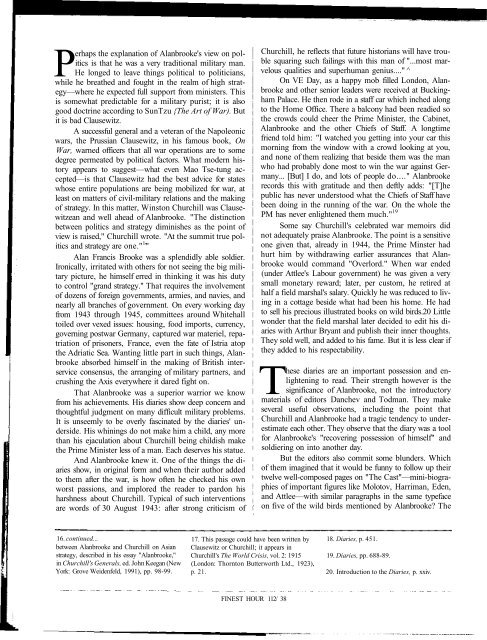What kind of a People do they think we are? - Winston Churchill
What kind of a People do they think we are? - Winston Churchill
What kind of a People do they think we are? - Winston Churchill
- No tags were found...
You also want an ePaper? Increase the reach of your titles
YUMPU automatically turns print PDFs into web optimized ePapers that Google loves.
Perhaps the explanation <strong>of</strong> Alanbrooke's view on politicsis that he was a very traditional military man.He longed to leave things political to politicians,while he breathed and fought in the realm <strong>of</strong> high strategy—wherehe expected full support from ministers. Thisis somewhat predictable for a military purist; it is alsogood <strong>do</strong>ctrine according to SunTzu {The Art <strong>of</strong> War). Butit is bad Clausewitz.A successful general and a veteran <strong>of</strong> the Napoleonicwars, the Prussian Clausewitz, in his famous book, OnWar, warned <strong>of</strong>ficers that all war operations <strong>are</strong> to somedegree permeated by political factors. <strong>What</strong> modern historyappears to suggest—what even Mao Tse-tung accepted—isthat Clausewitz had the best advice for stateswhose entire populations <strong>are</strong> being mobilized for war, atleast on matters <strong>of</strong> civil-military relations and the making<strong>of</strong> strategy. In this matter, <strong>Winston</strong> <strong>Churchill</strong> was Clausewitzeanand <strong>we</strong>ll ahead <strong>of</strong> Alanbrooke. "The distinctionbet<strong>we</strong>en politics and strategy diminishes as the point <strong>of</strong>view is raised," <strong>Churchill</strong> wrote. "At the summit true politicsand strategy <strong>are</strong> one." 1 ''Alan Francis Brooke was a splendidly able soldier.Ironically, irritated with others for not seeing the big militarypicture, he himself erred in <strong>think</strong>ing it was his dutyto control "grand strategy." That requires the involvement<strong>of</strong> <strong>do</strong>zens <strong>of</strong> foreign governments, armies, and navies, andnearly all branches <strong>of</strong> government. On every working dayfrom 1943 through 1945, committees around Whitehalltoiled over vexed issues: housing, food imports, currency,governing postwar Germany, captured war materiel, repatriation<strong>of</strong> prisoners, France, even the fate <strong>of</strong> Istria atopthe Adriatic Sea. Wanting little part in such things, Alanbrookeabsorbed himself in the making <strong>of</strong> British interserviceconsensus, the arranging <strong>of</strong> military partners, andcrushing the Axis everywhere it d<strong>are</strong>d fight on.That Alanbrooke was a superior warrior <strong>we</strong> knowfrom his achievements. His diaries show deep concern andthoughtful judgment on many difficult military problems.It is unseemly to be overly fascinated by the diaries' underside.His whinings <strong>do</strong> not make him a child, any morethan his ejaculation about <strong>Churchill</strong> being childish makethe Prime Minister less <strong>of</strong> a man. Each deserves his statue.And Alanbrooke knew it. One <strong>of</strong> the things the diariesshow, in original form and when their author addedto them after the war, is how <strong>of</strong>ten he checked his ownworst passions, and implored the reader to par<strong>do</strong>n hisharshness about <strong>Churchill</strong>. Typical <strong>of</strong> such interventions<strong>are</strong> words <strong>of</strong> 30 August 1943: after strong criticism <strong>of</strong><strong>Churchill</strong>, he reflects that future historians will have troublesquaring such failings with this man <strong>of</strong> "...most marvelousqualities and superhuman genius...." ^On VE Day, as a happy mob filled Lon<strong>do</strong>n, Alanbrookeand other senior leaders <strong>we</strong>re received at BuckinghamPalace. He then rode in a staff car which inched alongto the Home Office. There a balcony had been readied sothe crowds could cheer the Prime Minister, the Cabinet,Alanbrooke and the other Chiefs <strong>of</strong> Staff. A longtimefriend told him: "I watched you getting into your car thismorning from the win<strong>do</strong>w with a crowd looking at you,and none <strong>of</strong> them realizing that beside them was the manwho had probably <strong>do</strong>ne most to win the war against Germany...[But] I <strong>do</strong>, and lots <strong>of</strong> people <strong>do</strong>...." Alanbrookerecords this with gratitude and then deftly adds: "[T]hepublic has never understood what the Chiefs <strong>of</strong> Staff havebeen <strong>do</strong>ing in the running <strong>of</strong> the war. On the whole thePM has never enlightened them much." 19Some say <strong>Churchill</strong>'s celebrated war memoirs didnot adequately praise Alanbrooke. The point is a sensitiveone given that, already in 1944, the Prime Minster hadhurt him by withdrawing earlier assurances that Alanbrookewould command "Overlord." When war ended(under Attlee's Labour government) he was given a verysmall monetary reward; later, per custom, he retired athalf a field marshal's salary. Quickly he was reduced to livingin a cottage beside what had been his home. He hadto sell his precious illustrated books on wild birds.20 Littlewonder that the field marshal later decided to edit his diarieswith Arthur Bryant and publish their inner thoughts.They sold <strong>we</strong>ll, and added to his fame. But it is less clear if<strong>they</strong> added to his respectability.These diaries <strong>are</strong> an important possession and enlighteningto read. Their strength ho<strong>we</strong>ver is thesignificance <strong>of</strong> Alanbrooke, not the introductorymaterials <strong>of</strong> editors Danchev and Todman. They makeseveral useful observations, including the point that<strong>Churchill</strong> and Alanbrooke had a tragic tendency to underestimateeach other. They observe that the diary was a toolfor Alanbrooke's "recovering possession <strong>of</strong> himself" andsoldiering on into another day.But the editors also commit some blunders. Which<strong>of</strong> them imagined that it would be funny to follow up theirt<strong>we</strong>lve <strong>we</strong>ll-composed pages on "The Cast"—mini-biographies<strong>of</strong> important figures like Molotov, Harriman, Eden,and Attlee—with similar paragraphs in the same typefaceon five <strong>of</strong> the wild birds mentioned by Alanbrooke? The16. continued...bet<strong>we</strong>en Alanbrooke and <strong>Churchill</strong> on Asianstrategy, described in his essay "Alanbrooke,"in <strong>Churchill</strong>'s Generals, ed. John Keegan (NewYork: Grove Weidenfeld, 1991), pp. 98-99.17. This passage could have been written byClausewitz or <strong>Churchill</strong>; it appears in<strong>Churchill</strong>'s The World Crisis, vol. 2: 1915(Lon<strong>do</strong>n: Thornton Butterworth Ltd., 1923),p. 21.18. Diaries, p. 451.19. Diaries, pp. 688-89.20. Introduction to the Diaries, p. xxiv.FINEST HOUR 112/ 38

















